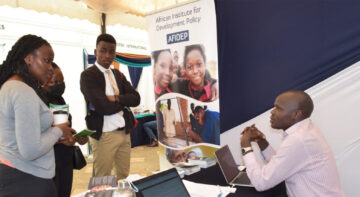Blogs

The whole world is now witnessing the profound influence of health on all aspects of life. In these times of COVID-19, it is not just public health that is being affected, but also businesses, travel, schooling, job security, and social networks, just to name a few. Gone are the days when health was only a consideration in clinics and hospitals. Now we see very clearly that health is omnipresent—it transcends individuals, health facilities, sectors, and countries. Despite this reality, our policies and systems are ill-equipped to prepare for and respond to health challenges in our globalised and interconnected world. Why do these gaps exist, and what can be done about it?
At AFIDEP, our mission is to bridge the work of researchers, policymakers, and practitioners. In health, such work is especially relevant. Researchers and academics can do a lot in generating information, but too little of it is reflected in policy, especially in policies which are not directly health-related. Decisions are made at country level on measures to control infectious diseases, for example, without aligning the policies to other health issues, or neighbouring countries’ policies or even to non-health specific policies in areas like immigration and national security. The global community is now learning (the hard way) that we are, in fact, an incredibly and increasingly interconnected global community that needs integrated, cross-sectoral systems that take into account the most credible and comprehensive evidence available.
The global community is now learning that we are an increasingly interconnected global community that needs integrated, cross-sectoral systems that take into account the most credible and comprehensive evidence available. Share on XThe impact of integrated systems which are informed by evidence versus those which are fragmented and based in mere opinion is perfectly exemplified by differing COVID-19 policy responses and the resulting levels of infections and deaths. Countries like China, for example, have made an incredible comeback by instituting strict quarantining measures. On the other hand, we are witnessing how countries like the United States, Italy and Spain are now struggling to keep up with all the COVID-19 cases due, in large part, to their slow acknowledgement of emerging research and evidence on the severity of COVID-19. However, an evidence-informed policy response, albeit late, can still save lives – parts of the United States are now seeing a slowing of transmission as a result of stay-at-home and social-distancing policies.
The disconnect between health researchers, policymakers and practitioners exists for several reasons. First, people often assume that working within the health sector means being either a doctor or a researcher. While both professions are, undoubtedly, integral to successful health sectors, they are only small pieces of the puzzle. In reality, substantial efforts are needed to bridge the work of researchers and health workers together—to ensure researchers’ evidence is applied by practitioners in the health system AND to ensure that all other systems are enabling factors for the health sector to do its job well. Unfortunately, many health sectors have and are developing under this assumption that health systems are simply a product of strong research and health care providers. However, that mentality fails to acknowledge the critical role of policymakers and the major influence of other industries and sectors on health.
The gap between research and practice is worsened by the fact that policymakers, themselves, don’t always recognise their responsibility to enact policies that are grounded in comprehensive evidence and research. To address this, AFIDEP has developed a training for policymakers in evidence-informed policy-making (EIPM). The training has been delivered to nearly 80 Ministry of Health and Parliament staff from Kenya and Malawi, with participants trained in defining a policy question, and accessing, assessing, synthesizing, and applying evidence. Feedback has highly been positive, and resulted in participants championing EIPM; in 2019, Ms. Velia Manyonga, Head of the Research Division at the Parliament of Malawi and a beneficiary of the training programme, was the first recipient of the African Evidence Network (AEN)’s Africa Evidence Leadership Award (AELA).
Lastly, health researchers too often deem their job done once their findings are published in peer-reviewed journals and presented at conferences. However, if the knowledge generated is to have an impact, the work is far from over. Ultimately, the surest way to ensure that society benefits from research evidence is by enacting policies that can have widespread influence if they are well implemented and integrated. Because many health researchers don’t consider their jobs political in nature, they tend to shy away from engaging in politics and policy. AFIDEP has realised, however, that health researchers need to get political to maximise the impact of their research. Just as the link from policy to research needs to be strengthened, the link from research to policy also must be fortified.
To this end, AFIDEP developed a five-day Policy Engagement and Evidence Uptake Training for early-career African researchers to equip them with the tools needed to develop and implement policy engagement strategies. The training re-orients policy- and influential decision-makers as priority audiences and end-users of researchers’ work. Over the last five years, the training has been adapted for several audiences including African lung health PhD and post-doctoral students, African vector control researchers, and a range of scholars from the African Academy of Sciences. Each training has seen some initial push-back from participants, as adding hefty policy responsibilities for already complex and time-constrained research can be a hard sell. However, by the end of each training, participants have completely bought-in to the need for researchers to engage with policy-making processes and have expressed excitement about taking forward their policy engagement plans.
The demonstrated and potential impact of the training is remarkable. For example, many of the participants have gone on to conduct policy analyses as part of their research studies, with others developing policy briefs about their research areas. Trainees are equipped with the critical skills and knowledge needed for policy engagement: they can integrate policy analysis in their research, map key stakeholders, critique and outline policy briefs, develop tailored lay summaries of their research, and communicate their research topics in terms of policymakers’ interests. Overall training evaluations show a double-digit increase in average scores between pre and post-test. Ultimately, participants’ biggest piece of feedback is the need for more time for each module and activity…basically, one week is not enough! For entomologist Elizabeth Bandason, the training had a profound impact. She notes, “being a scientist who has spent so much time glued to a laboratory bench finding answers on why insects behave the way they do, my focus was on getting results, I did not care so much about the so what? Participating in the AFIDEP training, changed my whole perspective on my research. I learned to communicate my research in the simplest way and I was able to answer the so what?”
There remains much work to address the disconnect between health research, policy, systems, and delivery as evidenced by the novel COVID-19 pandemic. AFIDEP’s capacity strengthening for researchers and policymakers is an important step in bridging the gap between research and policy. Researchers, like Ms Bandason, and policymakers, like Ms Manyonga, demonstrate that there is a demand for and value in synchronising research, policy and practice. Such work is a promising step towards a future where health evidence is mainstreamed into our governing policies and systems for improved health outcomes in Malawi, Kenya, across the continent, and beyond.
Related Posts





